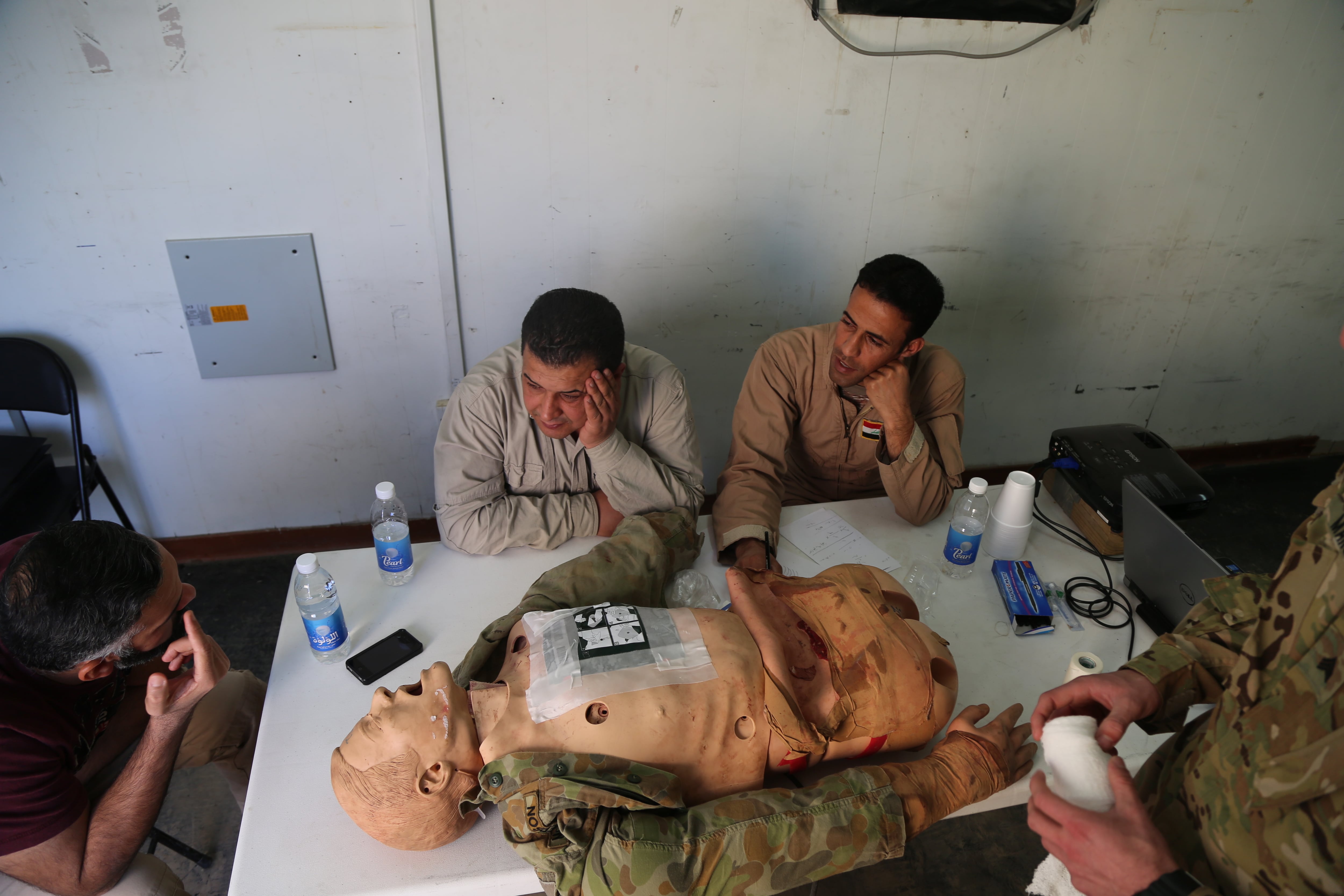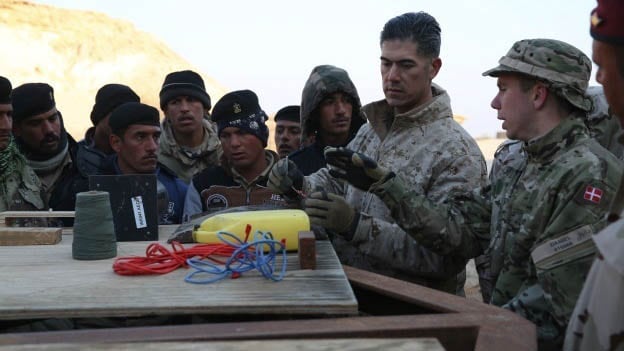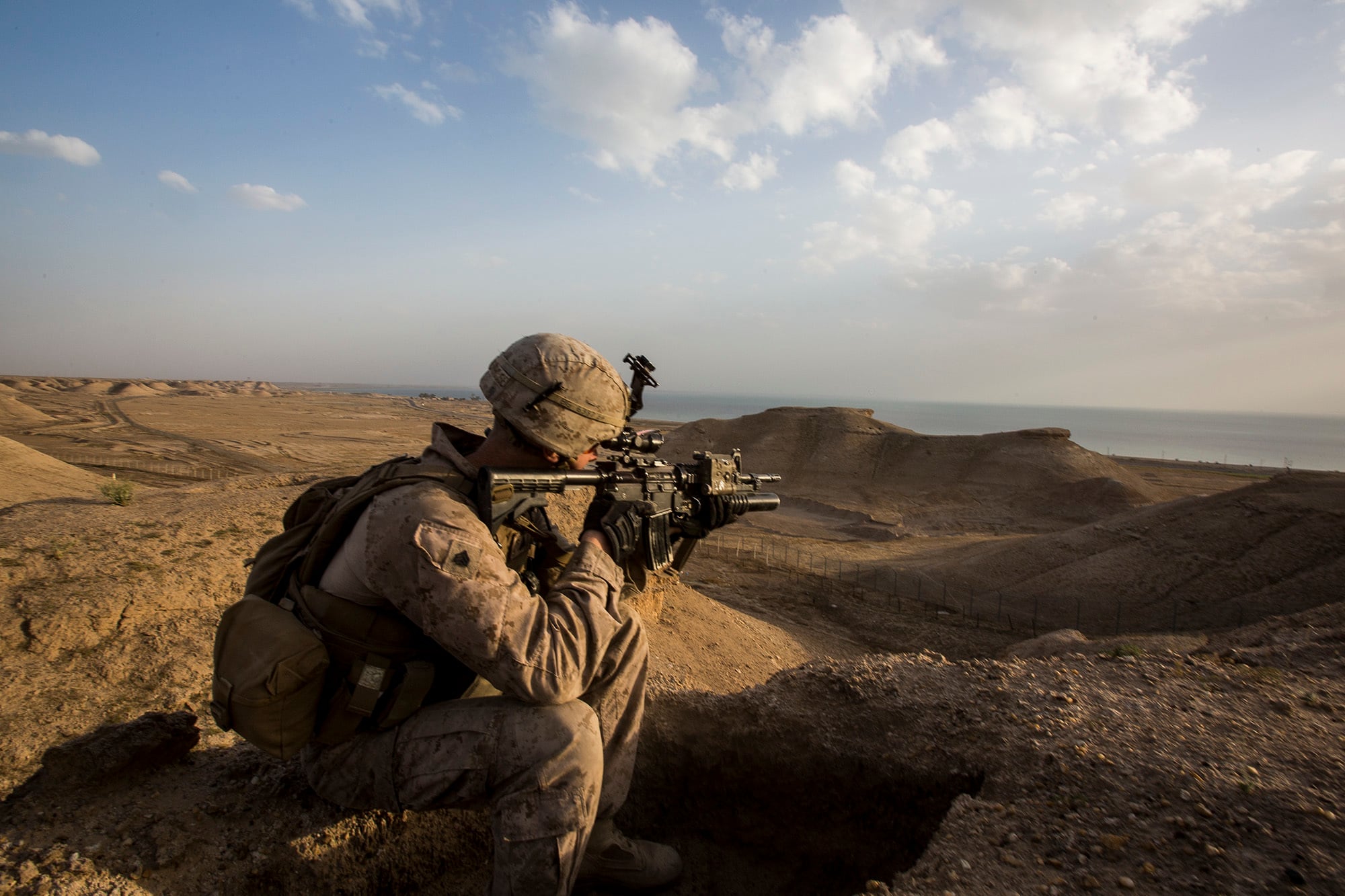When the U.S. Marines arrived at Iraq's Al Asad air base last year, 26 combat advisers sent there to help choreograph a battle plan for ousting the Islamic State group, they were greeted by local soldiers dumbfounded to learn the Americans had no intention of leading the fight from the front.
"The Iraqis," recalled Col. David Casey, who commanded those Marines, "really believed that we were going to come back with a larger force, and that we were going to take care of it." They'd ask things like "when are you coming with the rest of your stuff?"
President Obama has made clear he will not send large infantry units back to Iraq, instead advocating a strategy that puts the onus on Baghdad to provide the necessary front-line troops. But the size and scope of the U.S. mission there has only grown as doubts persist about the Iraqis' resolve.
In April, the The Pentagon’s announced plans to ment Monday that will move put more American troops in Iraq closer to the front lines of the fight against Islamic State militants is the latest U.S. effort to stiffen the Iraqi Army’s resolve and push them to fight more aggressively. Defense Secretary Ash Carter said the U.S. will expand its train-advise-and-assist mission once again, deploying an additional 200 troops to work, for the first time in years, alongside Iraqi units at the brigade and battalion levels — much closer to the action. Defense Secretary Ash Carter also authorized the use of U.S. Army attack helicopters to support for Iraqi ground troops.
Both moves, which mean will put more U.S. personnel will be troops at greater risk of coming under direct and indirect enemy fire, are meant to embolden the Iraqis and compel them to fight more aggressively, officials say. American commanders hope they can jolt their allies by providing from Islamic State militants, also known as ISIS or ISIL. Yet it will also offering greater Iraqi soldiers at the tip of the spear more confidence that they will have access to essential combat enablers such as reliable communications lines, close-air support and medical care.
"This is not rocket science," a said one former senior U.S. commander in Iraq told Military Times in a recent interview. "The Iraqi soldiers have in the past, and in the present they are, fighting when they have good leadership and confidence that someone has their back."
Weak morale has plagued the Iraqi army for years, going back to the U.S occupation. For years U.S. military officials have raised questions about the Iraqis morale and combat effectiveness. Last spring, for instance, after American-trained year after Iraqi Army troops fled the ISIS advance on Ramadi, Carter declared said they "just showed no will to fight."
Backed by U.S. air power, the Iraqis managed to retake most of the city earlier this year. But criticism has resurfaced as the And those criticisms intensified again after the Iraqis declared on March 24 a new offensive to retake aimed at retaking Mosul, the largest ISIS stronghold, has stalled city under control of the Islamic State militants. That offensive has stalled amid reports that Iraqi army soldiers are not fighting effectively and have failed to win control of several small villages near their main command center in Makhmour, a Kurdish-controlled city southeast of the city Mosul.
Some Iraqi troops have been expecting the Americans to return with large combat units and lead the entire fight against ISIS. For example, when Marine Col. David Casey got to Iraq's al Anbar Province last year to help train Iraq Army troops, many of those Iraqi soldiers were stunned to learn that he'd showed up at al Assad Air Base with only a small team of 26 Marines and no plans to step outside the wire.
"The Iraqis really believed that we were going to come back with that larger force and that we were going to take care of it," Casey said recently after returning from a nine-month deployment as commander of Task Force-Al Asad's "Advise and Assist" team.
The Iraqis "often were looking at us – at least from the low level – (asking) when you are coming with the rest of your stuff?" he said. Many expected the U.S. forces to confront ISIS directly just as they had the extremist group known as al-Qaida in Iraq almost a decade earlier.
President Barack Obama has made clear he has no intention sending large infantry units to Iraq for a combat mission.
The Pentagon's new plan April 18 Yet Monday’s announcement will raises the authorized U.S. military footprint in Iraq to nearly 4,100. It of expanding the advise-and-assist mission is the latest and most dramatic in a series of policy changes, made throughout over the past six months, aimed at generating more productivity on the ground from the that allow American troops to expand their support for the Iraqis. Small teams of Americans, mostly Army Special Forces as well as some Marines, have been on the ground supporting Iraqis operations.
"We’re starting to raise the bar on how close we’re letting folks get to actual combat," said James Poss, a retired Air Force major general who's now a researcher at Mississippi State University, said in a recent interview. "Using special forces, particularly forward air controllers really close, that would help quite a bit — both [for the Iraqis] to knowing that the special forces advisers can apply air power more effectively and, maybe more importantly, to avoid friendly fire. The Iraqis know that if you have a few Americans on the ground that will help avoid mistakes," said Poss, who now directs research projects at Mississippi State University. "You're going to see more and more applied to it until the problem goes away," he said."
The Iraqi Army's confidence suffered a catastrophic blow in 2014 when entire divisions collapsed and thousands of soldiers shed their uniforms and fled when confronted with Islamic State militants advancing south from Mosul toward Baghdad.
Bolstering the Iraqi army's lower ranks is proving to be the most important and complex part of the U.S. training mission, said Army Maj. Adam Scher, who participated in that mission deployed last year to provide Iraq to support the "building partner capacity" mission that offers unit-level training for the Iraqi forces, said bolstering confidence among the Iraqi forces’ lower ranks is an important and complex piece of the American-led training effort that began in 2014. Instilling He said the Iraqis' "will to fight" reflects an array of factors that include courage, and bravery is one part of the challenge, he said. They also face but also more pragmatic shortfalls with elements such as good training, equipment, and administration.
Two years ago, for For example, he said, in 2014, the Iraqi army wasn't teaching training its soldiers about in first aid or medical evacuation procedures, Scher said. Rank-and-file personnel had no faith So the leaving individual soldiers with no confidence they would survive a battlefield injury. Add to that the lack of healthcare benefits and health support for Iraqi veterans. Iand the individual soldiers were — understandably — have worried about the financial fallout their families would suffer should they get wounded that any battlefield injuries would be financially devastating for their families.

U.S. Army medics teach battlefield life-saving skills to Iraqi soldiers at Camp Taji in March.
Photo Credit: Sgt. Kalie Jones/Army
At On the tactical level, the American-led training involves giving the Iraqis detailed techniques for how to defusing improvised explosives, device, how to responding to a car bomb and engineering tactics for breaching battlefield obstacles on the battlefield. They also spend And they spent a lot of time fine-tuning the communications procedures required needed for airstrikes and how the Iraqi’s forward observers can quickly contact their own headquarters and translate that into a request for U.S. air support, Scher said. Having Putting U.S. adviseors within at the Iraqi brigades and batallions level will vastly improve the communications lines between front-line Iraqi troops and the American commanders who can approve air strikes and other combat support measures, Scher said.
For the Iraqis, testing their skills in large-scale exercises was very effective, Scher said.
"The live fire exercises helped them to build confidence in their unit, confidence in their equipment and confidence with the Iraqi soldiers on their left and their right," Scher said in a recent interview.
American officials in Baghdad acknowledge the concerns about the Iraqi soldiers. "We've had problems with some of the leaders who have not been as aggressive as we would like," said Army Col. Steve Warren, a spokesman for the anti-ISIS coalition said at a press briefing on April 13.
"But what's encouraging is that the Iraqi senior leaders have noticed this as well and they have fired division commanders," he said, noting the removal of high-ranking commanders in Ramadi several months ago and again more recently in a unit near Makhmour that was preparing for the battle for Mosul. "So we're starting to see this army act like an army. And, yes, there have been moments where they could have done better. But broadly speaking, across the board, we believe that overall their level is coming up," he said."

Marine Chief Warrant Officer 2 Juan Rodriguez teaches Iraqi troops how to counter an improvised explosive device during a class at Al Asad air base in Iraq's Anbar province.
Photo Credit: Cpl. Carson Gramley/Marine Corps
Casey, the Marine colonel whose advisory team was in Anbar province between July and April, said that is his impression too. When they arrived at Al Asad, it was a shell of the sprawling base the Americans built a decade ago. Today it looks like the setting of a "Mad Max" movie, he said, with abandoned buildings, mangled wiring and utility lines, and general dilapidation. The Iraqis just assumed the Marines would rebuild the place for them. Instead, the Marines put the Iraqis to work.
The first sign of hope came in the fall, when Casey's Marines directed an assault on an ISIS checkpoint. The Iraqis conducted the operation on their own — and still hold the ground today, he said.
"No one really thought they could do it. They didn't think they could do it," Casey added. "... It spoke to the confidence they had in themselves and the willingness — finally — to go from being in a defensive posture to now going on the attack."
Then in January about 230 ISIS fighters tried to seize the town of Barwana, near Hadithah Dam. Aided by a group of tribal fighters, Iraqi soldiers fought off the militants. To Casey, this signaled real change.
The One former senior U.S. commander, who asked not to be identified, said the Iraqis' slow pace of progress is unsurprising given the administration's strategy. "People don’t get out how different this is for us," he said, "to be conducting a major combat operation essentially with somebody else’s ground forces and without advisers on the ground at the front lines," said the former commander, who asked not to be identified.
It's vital, he added, for the Iraqis to Nevertheless, the former commander said he supports that basic strategy so the Iraqis can prove that they alone can their an ability to maintain their its own victories. "If they need to have advisers at the front lines," he said, "then they can’t’ sustain what they’d achieve," he said."
Tilghman is Military Times' Pentagon bureau chief. Fuentes is a Military Times contributor. She reported from Camp Pendleton, California.

Marine Sgt. Josh Greathouse scans the area near Al Taqaddum, Iraq, in March.
Photo Credit: Sgt. Ricardo Hurtado/Marine Corps
Andrew Tilghman is the executive editor for Military Times. He is a former Military Times Pentagon reporter and served as a Middle East correspondent for the Stars and Stripes. Before covering the military, he worked as a reporter for the Houston Chronicle in Texas, the Albany Times Union in New York and The Associated Press in Milwaukee.





